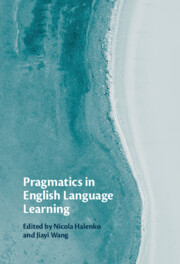Book contents
- Pragmatics in English Language Learning
- Pragmatics in English Language Learning
- Copyright page
- Contents
- Figures
- Tables
- Contributors
- Foreword
- Acknowledgements
- Introduction
- 1 Second Language Pragmatics
- Part I Pragmatics in Action
- 2 ‘Mind Your Language’
- 3 Pragmatic Development in Request Performance
- 4 Placing Oneself in the Reader’s Shoes
- 5 ‘Hey, You, Can I Loan Your Yellow Pencil?’
- Part II Instructed Pragmatics
- Index
- References
2 - ‘Mind Your Language’
L2 English Email Requests during Study Abroad
from Part I - Pragmatics in Action
Published online by Cambridge University Press: 29 September 2022
- Pragmatics in English Language Learning
- Pragmatics in English Language Learning
- Copyright page
- Contents
- Figures
- Tables
- Contributors
- Foreword
- Acknowledgements
- Introduction
- 1 Second Language Pragmatics
- Part I Pragmatics in Action
- 2 ‘Mind Your Language’
- 3 Pragmatic Development in Request Performance
- 4 Placing Oneself in the Reader’s Shoes
- 5 ‘Hey, You, Can I Loan Your Yellow Pencil?’
- Part II Instructed Pragmatics
- Index
- References
Summary
There is an ever-growing consensus amongst EFL/ESL researchers that while L2 learners may improve their English language proficiency during a period of study abroad in the target language, they may not show concomitant development of pragmatic competence. This mixed-methods study aimed to examine this interlanguage issue by tracking asymmetrical email communication with academic staff. Using 170 authentic L2 emails in comparison to a reference corpus of 162 authentic L1 emails, we identified three distinct features of the Chinese learners’ L2 email requests to faculty: significant directness and limited choices of conventional indirectness, extensive external modification and relative limited internal modification, and heavy reliance on the request perspectives of ‘you’ and ‘I’. L2 email practices also remained largely unchanged during study abroad in England, suggesting a ten-month immersion in the L2 environment alone was insufficient to evidence developmental change. Learners found it challenging to implicitly acquire more complicated pragmatic structures such as internal modification, for instance. Participant interviews revealed learner agency played a key role in pragmatic learning and unlearning, the latter of which refers to the process by which learners actively dissociate from L2 norms when conflicts with the L1 systems arise, implying that L2 pragmatic development is fluid.
- Type
- Chapter
- Information
- Pragmatics in English Language Learning , pp. 29 - 56Publisher: Cambridge University PressPrint publication year: 2022



